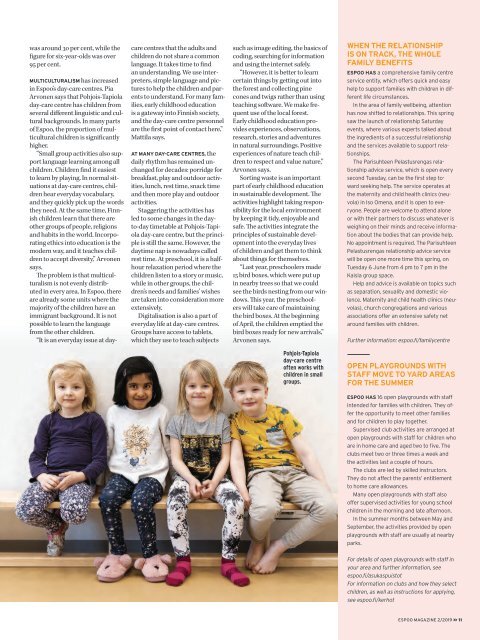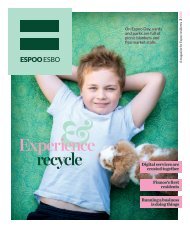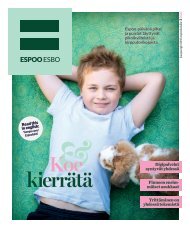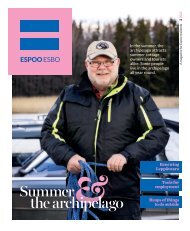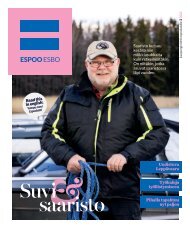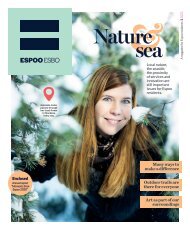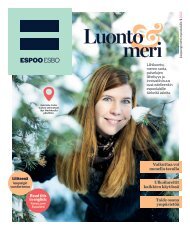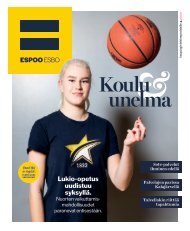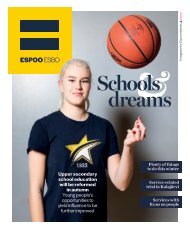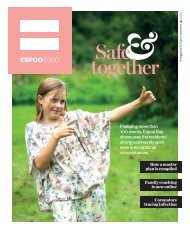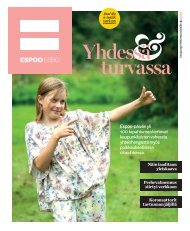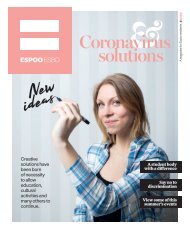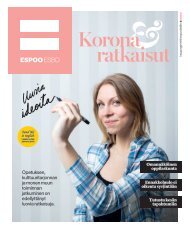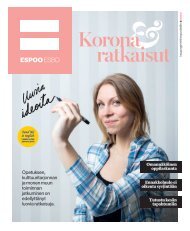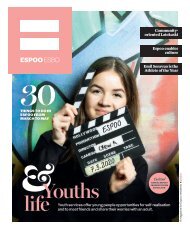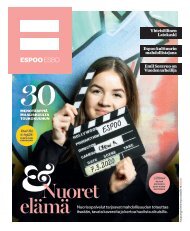ESPOO MAGAZINE 2/2019
A MAGAZINE FOR ESPOO RESIDENTS
A MAGAZINE FOR ESPOO RESIDENTS
- No tags were found...
You also want an ePaper? Increase the reach of your titles
YUMPU automatically turns print PDFs into web optimized ePapers that Google loves.
was around 30 per cent, while the<br />
figure for six-year-olds was over<br />
95 per cent.<br />
MULTICULTURALISM has increased<br />
in Espoo’s day-care centres. Pia<br />
Arvonen says that Pohjois-Tapiola<br />
day-care centre has children from<br />
several different linguistic and cultural<br />
backgrounds. In many parts<br />
of Espoo, the proportion of multicultural<br />
children is significantly<br />
higher.<br />
“Small group activities also support<br />
language learning among all<br />
children. Children find it easiest<br />
to learn by playing. In normal situations<br />
at day-care centres, children<br />
hear everyday vocabulary,<br />
and they quickly pick up the words<br />
they need. At the same time, Finnish<br />
children learn that there are<br />
other groups of people, religions<br />
and habits in the world. Incorporating<br />
ethics into education is the<br />
modern way, and it teaches children<br />
to accept diversity,” Arvonen<br />
says.<br />
The problem is that multiculturalism<br />
is not evenly distributed<br />
in every area. In Espoo, there<br />
are already some units where the<br />
majority of the children have an<br />
immigrant background. It is not<br />
possible to learn the language<br />
from the other children.<br />
“It is an everyday issue at daycare<br />
centres that the adults and<br />
children do not share a common<br />
language. It takes time to find<br />
an understanding. We use interpreters,<br />
simple language and pictures<br />
to help the children and parents<br />
to understand. For many families,<br />
early childhood education<br />
is a gateway into Finnish society,<br />
and the day-care centre personnel<br />
are the first point of contact here,”<br />
Mattila says.<br />
AT MANY DAY-CARE CENTRES, the<br />
daily rhythm has remained unchanged<br />
for decades: porridge for<br />
breakfast, play and outdoor activities,<br />
lunch, rest time, snack time<br />
and then more play and outdoor<br />
activities.<br />
Staggering the activities has<br />
led to some changes in the dayto-day<br />
timetable at Pohjois-Tapiola<br />
day-care centre, but the principle<br />
is still the same. However, the<br />
daytime nap is nowadays called<br />
rest time. At preschool, it is a halfhour<br />
relaxation period where the<br />
children listen to a story or music,<br />
while in other groups, the children’s<br />
needs and families’ wishes<br />
are taken into consideration more<br />
extensively.<br />
Digitalisation is also a part of<br />
everyday life at day-care centres.<br />
Groups have access to tablets,<br />
which they use to teach subjects<br />
such as image editing, the basics of<br />
coding, searching for information<br />
and using the internet safely.<br />
“However, it is better to learn<br />
certain things by getting out into<br />
the forest and collecting pine<br />
cones and twigs rather than using<br />
teaching software. We make frequent<br />
use of the local forest.<br />
Early childhood education provides<br />
experiences, observations,<br />
research, stories and adventures<br />
in natural surroundings. Positive<br />
experiences of nature teach children<br />
to respect and value nature,”<br />
Arvonen says.<br />
Sorting waste is an important<br />
part of early childhood education<br />
in sustainable development. The<br />
activities highlight taking responsibility<br />
for the local environment<br />
by keeping it tidy, enjoyable and<br />
safe. The activities integrate the<br />
principles of sustainable development<br />
into the everyday lives<br />
of children and get them to think<br />
about things for themselves.<br />
“Last year, preschoolers made<br />
15 bird boxes, which were put up<br />
in nearby trees so that we could<br />
see the birds nesting from our windows.<br />
This year, the preschoolers<br />
will take care of maintaining<br />
the bird boxes. At the beginning<br />
of April, the children emptied the<br />
bird boxes ready for new arrivals,”<br />
Arvonen says.<br />
WHEN THE RELATIONSHIP<br />
IS ON TRACK, THE WHOLE<br />
FAMILY BENEFITS<br />
<strong>ESPOO</strong> HAS a comprehensive family centre<br />
service entity, which offers quick and easy<br />
help to support families with children in different<br />
life circumstances.<br />
In the area of family wellbeing, attention<br />
has now shifted to relationships. This spring<br />
saw the launch of relationship Saturday<br />
events, where various experts talked about<br />
the ingredients of a successful relationship<br />
and the services available to support relationships.<br />
The Parisuhteen Pelastusrengas relationship<br />
advice service, which is open every<br />
second Tuesday, can be the first step toward<br />
seeking help. The service operates at<br />
the maternity and child health clinics (neuvola)<br />
in Iso Omena, and it is open to everyone.<br />
People are welcome to attend alone<br />
or with their partners to discuss whatever is<br />
weighing on their minds and receive information<br />
about the bodies that can provide help.<br />
No appointment is required. The Parisuhteen<br />
Pelastusrengas relationship advice service<br />
will be open one more time this spring, on<br />
Tuesday 6 June from 4 pm to 7 pm in the<br />
Kaisla group space.<br />
Help and advice is available on topics such<br />
as separation, sexuality and domestic violence.<br />
Maternity and child health clinics (neuvolas),<br />
church congregations and various<br />
associations offer an extensive safety net<br />
around families with children.<br />
Further information: espoo.fi/familycentre<br />
Pohjois-Tapiola<br />
day-care centre<br />
often works with<br />
children in small<br />
groups.<br />
OPEN PLAYGROUNDS WITH<br />
STAFF MOVE TO YARD AREAS<br />
FOR THE SUMMER<br />
<strong>ESPOO</strong> HAS 16 open playgrounds with staff<br />
intended for families with children. They offer<br />
the opportunity to meet other families<br />
and for children to play together.<br />
Supervised club activities are arranged at<br />
open playgrounds with staff for children who<br />
are in home care and aged two to five. The<br />
clubs meet two or three times a week and<br />
the activities last a couple of hours.<br />
The clubs are led by skilled instructors.<br />
They do not affect the parents’ entitlement<br />
to home care allowances.<br />
Many open playgrounds with staff also<br />
offer supervised activities for young school<br />
children in the morning and late afternoon.<br />
In the summer months between May and<br />
September, the activities provided by open<br />
playgrounds with staff are usually at nearby<br />
parks.<br />
For details of open playgrounds with staff in<br />
your area and further information, see<br />
espoo.fi/asukaspuistot<br />
For information on clubs and how they select<br />
children, as well as instructions for applying,<br />
see espoo.fi/kerhot<br />
<strong>ESPOO</strong> <strong>MAGAZINE</strong> 2/<strong>2019</strong> >> 11


